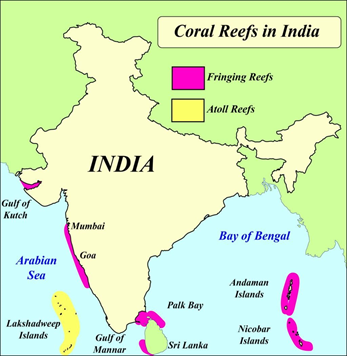

3rd March 2023 (6 Topics)
Context
Coral reefs are continuously damaged due to increases in ocean temperature and Climate Change.
What are coral reefs?
- Coral reefs are essentially just big limestone structures built by thousands of tiny coral creatures called polyps.
- Coral reefs are colonies of tiny living creatures that are found in oceans.
- They are underwater structures that are formed of coral polyps that are held together by calcium carbonate.
- Coral reefs are also regarded as the tropical rainforest of the sea and occupy just 0.1% of the ocean’s surface but are home to 25% of marine species.
- They are usually found in shallow areas at a depth of fewer than 150 feet. However, some coral reefs extend even deeper, up to about 450 feet
Types of Coral reefs in India:
India has three major prevailing types of coral reefs:
- Fringing reefs: Fringing reefs evolve and develop near the continent and remain close to the coastline. These reefs are separated from the coastline by small, shallow lagoons. They are the most commonly found reefs in the world.
- Barrier reefs: Barrier reefs are found offshore on the continental shelf. They usually run parallel to the coastline at some distance. A deep and wide lagoon is located between the coastline and the barrier reef.
- Atolls: Atolls are formed on mid-oceanic ridges. They are shaped circularly or elliptically and are surrounded by seas on all four sides and have shallow waters in the centre called a lagoon.
Factors affecting Coral Reefs:
- Extreme climate conditions: High temperature of water leads to the decline of these corals as they cannot survive in high temperatures. As estimated by scientists, most of the coral reefs of the world will soon decline with the increasing rates of ocean warming.
- Overfishing: It is another major concern as it is leading to an ecological imbalance of the coral reefs.
- Coastal development: The development of coastal infrastructure and tourist resorts on or close to these coral reefs causes significant damage.
- Pollution: The toxic pollutants which are dumped directly into the ocean can lead to the poisoning of the coral reefs as it increases the nitrogen level of the seawater leading to an overgrowth of algae.
- Sedimentation: Construction along the coasts and islands leads to soil erosion increasing the sediments in the river. As a result, it can smother corals by depriving them of the light needed to survive.
Importance of Coral Reefs:
Coral Reefs play an important role in the following ways.
- They protect coastlines from the damaging effects of wave action and tropical storms.
- They provide habitats and shelter for many marine organisms.
- They are the source of nitrogen and other essential nutrients for marine food chains.
- They assist in carbon and nitrogen-fixing.
- They help with nutrient recycling.
- The study of coral reefs is essential for scientifically testable records of climatic events over the past million years.
- The fishing industry depends also on coral reefs. Many fish spawn there, and juvenile fish spend time there before making their way to the open sea. The Great Barrier Reef generates more than 1.5 billion dollars annually for the Australian economy from fishing and tourism.
- Coral reefs are also key indicators of global ecosystem health. They serve as an early warning sign of what may happen to other less sensitive systems, such as river deltas if climate change is not urgently addressed.

More Articles


